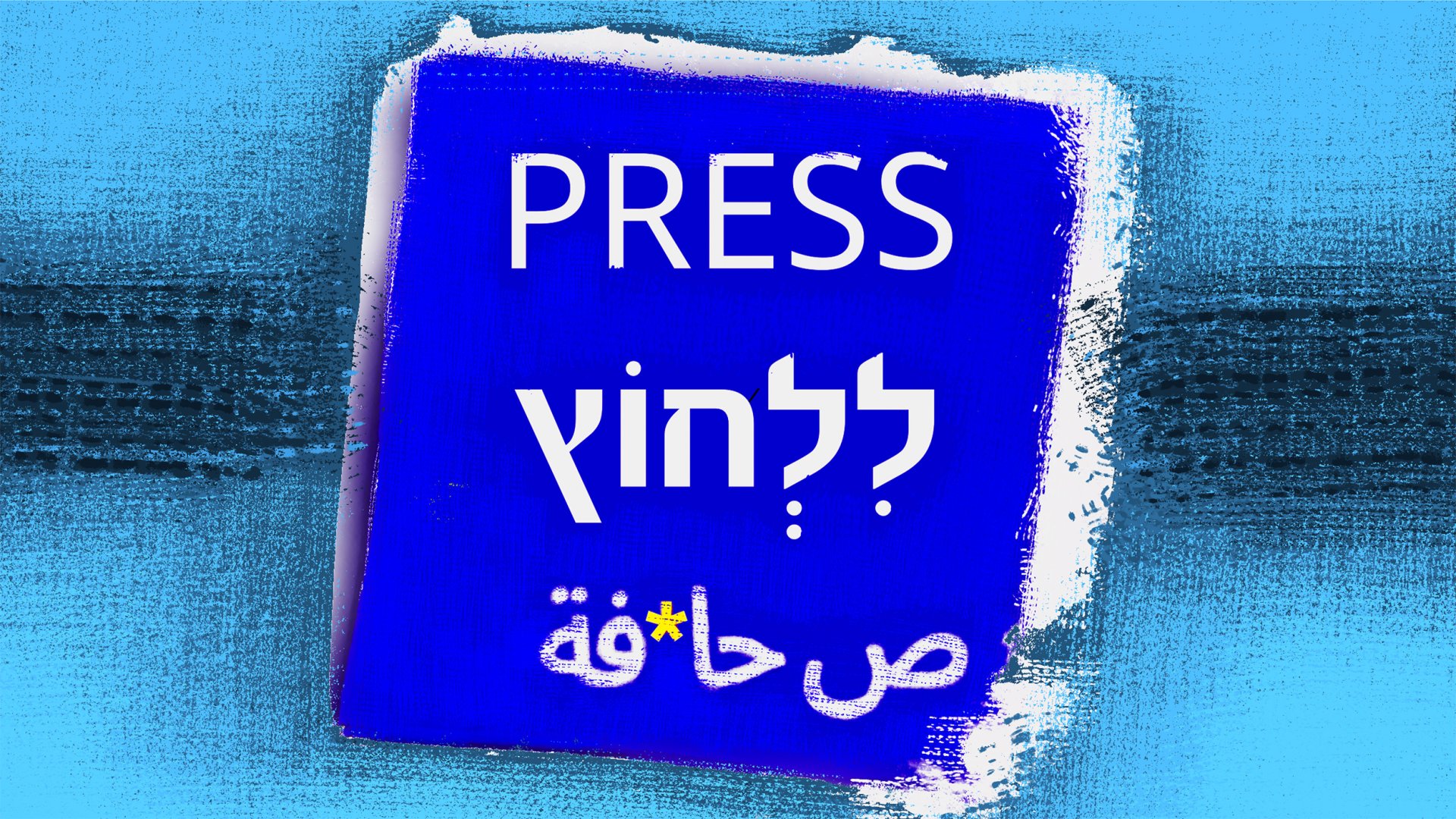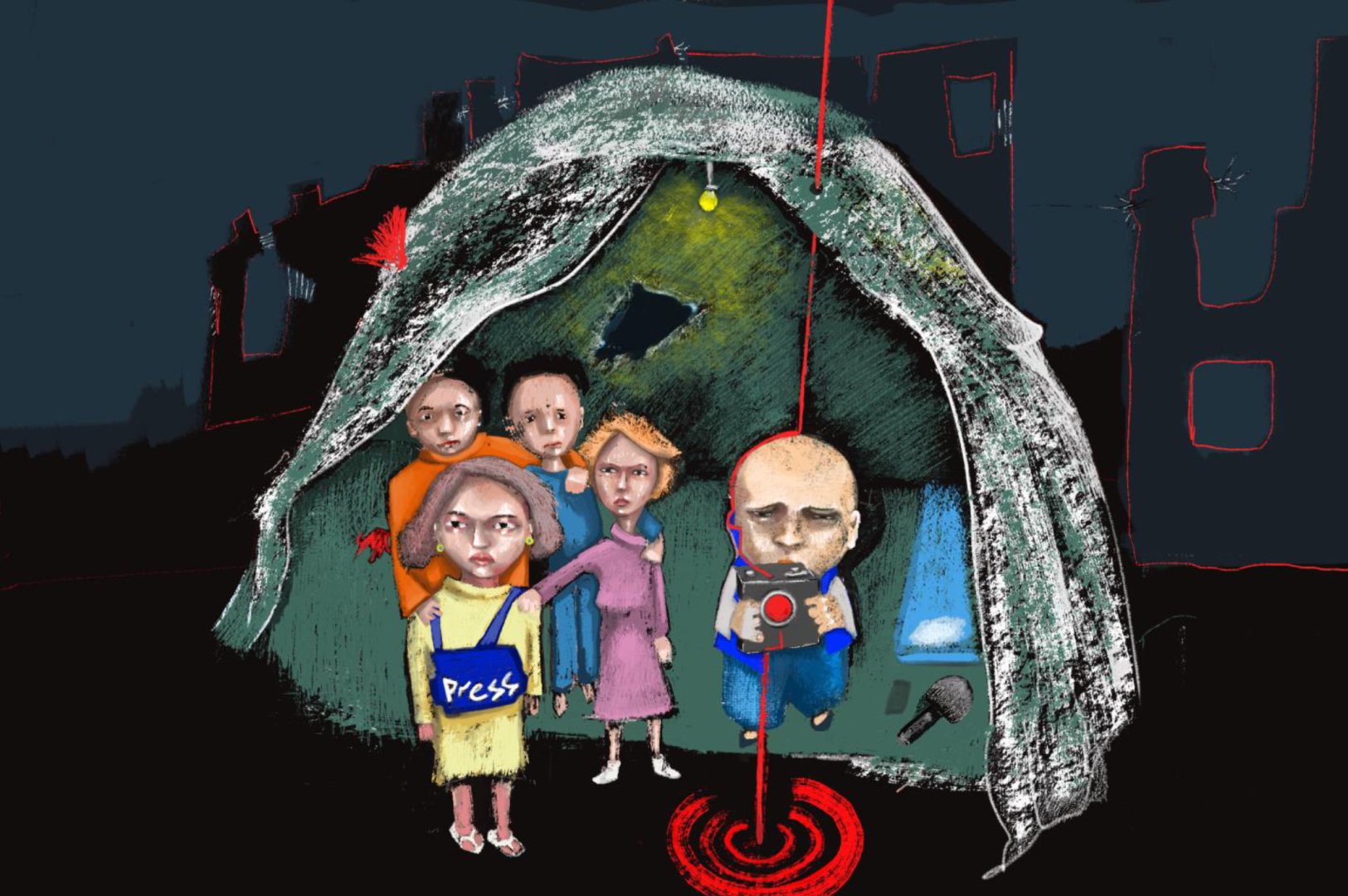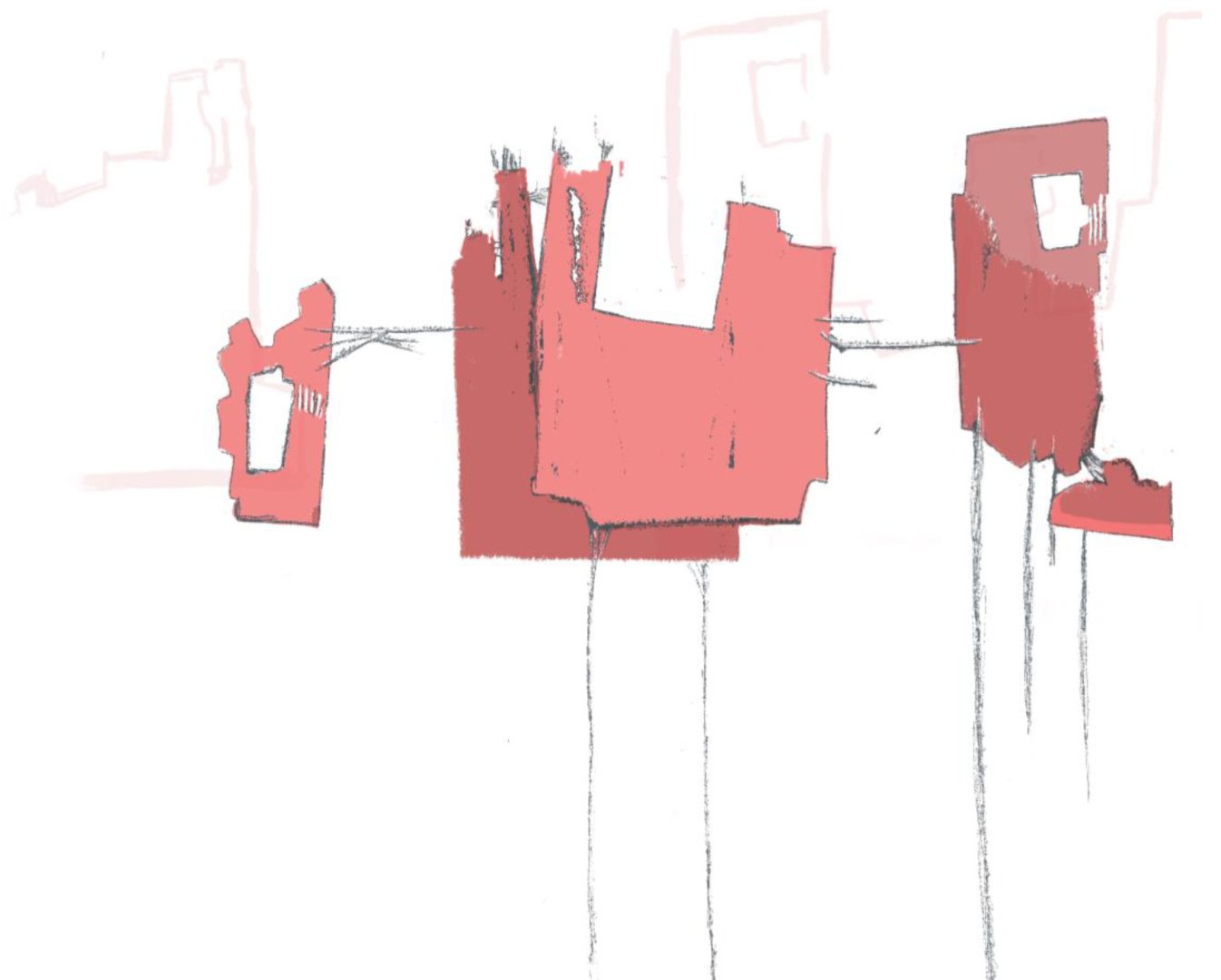
Artwork: Haisam Al Saiegh
IMS partners in Palestine reflect on a year of war in Gaza
Daily bombings, despair and disillusionment paired with a strong-willed insistence to continue working. Those are reoccurring sentiments among IMS partners working in Gaza and the West Bank.
Some have lost staff and family, seen colleagues injured and offices destroyed. IMS partner organisations in Palestine work in circumstances where charging a phone and staying alive are real wins.
In a Q&A with IMS, Filastiniyat, 7amleh and other partners from Palestine describe how priorities have changed and challenges mounted in the past 12 months.
“Our most important tasks this year have been to continue producing, documenting and archiving visual stories in Gaza, while supporting the safety and livelihoods of our team on the ground and keeping Gaza central across our social media platforms and events,” says Untold Palestine editor Mohamad Badarne in his response to IMS’ recent query.
With different words – but often a similar purpose – other IMS partners describe their pivot as a doubling-down on efforts to document atrocities, rights violations and the consequences of war, all while trying to keep staff safe and operations afloat.
Wattan Media Network, a media outlet, shifted their focus drastically to cover the humanitarian crisis in Gaza. With their “Voices from Gaza” series, they focus on documenting the severe conditions – displacement, hunger, death – faced by civilians, especially women, children and people with disabilities. Despite severe challenges, such as bombings of offices, loss of income because of halt of advertisements and donations, threats to journalists’ safety, and difficulties in maintaining communication and power, Wattan continues to produce these stories and share with an international audience.
Wattan has also prioritised safety, mental health and psychosocial support for its staff. No less than three of Wattan’s journalists have lost entire families.
Untold Palestine initiated “We are not Numbers” which has opened a door for the families of victims to have their voices heard in the way they choose. This campaign has also become a foundation for other similar initiatives. Our work has become both a moral obligation and a crucial lifeline in sharing the stories of the people of Gaza. A key aspect of this task is supporting the livelihood of local journalists and storytellers, enabling them to continue their work despite the enormous challenges they face.
To gain further insight into the work of IMS’ Palestine partners read their full responses below. Some answers have been edited for length and clarity by IMS, then approved.
Support the work of Gaza’s journalists by donating to IMS here.

Filastiniyat
Please describe what your organisation normally does, and how you have had to prioritise your work in Gaza and the West Bank since October last year?
Since its foundation in 2005, Filastiniyat has been working on promoting and empowering the Palestinian women and youth’s discourse through media. Through various programmes such as our Women Journalists Club and our youth debate club and our online media outlet “NAWA” we have worked with many of Gaza’s journalists.
What has been your most important task this year?
The main tasks were providing life-saving assistance to Gaza Strip journalists. We’ve offered cash, dignity and hygiene kits and warm clothes, with women journalists as a priority.
We’ve also established women journalists’ workstation tents near hospitals, with sleep-in facilities too. And provided e-sim cards, as well as connecting freelancers with international media outlets.
For Filastiniyat it is a strategic priority to ensure a continued production of stories covering all aspects of life during genocide, ensuring that stories are in line with our editorial policy and code of conduct. We have ensured that our content was translated into English to reach a broader audience.
As the situation deteriorates in the West Bank, we aided journalists in the West Bank through our “Media Protection Fund” in addition to securing helmets and protective jackets for women journalists.
Another priority has been coordinating local efforts of media development organisations supporting Gaza journalists, which eventually resulted in the formation of the Palestinian Media Task Force. Additionally, we have collected data about journalists and their needs inside the Gaza Strip and those who evacuated to Egypt.
What has been an important work-related lesson learned these past 12 months?
We have a responsibility to continue talking about Gaza’s journalists – those who were targeted and killed and those still alive and reporting. The international human rights institutions and global media failed in securing us, so it falls on us to continue and to mobilise international individual journalists to support their peers in Palestine and insist that they support Palestinian journalists – if not through financial means, then through telling their stories.
Finally, and most importantly, transparency with the journalist’s community is the best way to earn legitimacy and trust and ensure solidarity within the community too.
Going forward, what do you see as your most important priority?
Fundraising! We need funds that are not conditional, thus appealing to journalists and individuals is a priority. Also, having a comprehensive and realistic plan based on facts and priorities to save the Palestinian media scene (in both Gaza Strip and West Bank). This involves a continued flow of relief (cash, tents, clothes), workstations for media outlets with financial support, psychological counselling. Another priority will be to advocate for accountability of Israel.
What is one thing you wish the world knew about your life and work since October 2023?
I am angry, disappointed, yet, I don’t have the luxury to sit still because my family, my team and my friends are in Gaza expecting me to be their voice in my – relatively – comfort zone.

Witness
What does your organisation normally do, and how have you had to prioritize your work in Gaza and the West Bank since October last year?
Since October last year, our organisation has had to significantly reprioritise our work in Gaza and the West Bank due to the escalating challenges on the ground. In Gaza, we have placed a strong focus on supporting freelance journalists.
We have also engaged freelancers through the Peace Building Lab project funded by Lazismu, where we produced a campaign that included filming videos from Gaza, documenting the daily life and challenges.
In addition to financial support, we have provided psychological support to our workers from Gaza, recognising that mental health is a crucial aspect of maintaining their ability to continue their work amidst the significant pressures they endure.
What has been your most important task this year?
My most important task this year has been the development of programmes that are adaptable to the rapidly changing political environment. This flexibility is crucial to ensure our initiatives remain relevant and impactful. Equally important has been prioritising the safety and wellbeing of our employees, focusing on both their physical health and security. Ensuring their safety has been vital for maintaining the continuity and success of our operations.
What has been an important work-related lesson learned these past 12 months?
An important work-related lesson learned over the past 12 months is the critical importance of ensuring both sustainability and adaptability in our operations. We have recognised the need to secure operational expenses to sustain our work while also developing programmes that can adapt to ongoing political changes. Additionally, the safety and wellbeing of our employees, particularly their physical and health security, has emerged as a top priority. These elements are essential to ensuring the effectiveness and continuity of our mission.
Going forward, what do you see as your most important priority?
Going forward, our most important priority will be ensuring the sustainability of our work. This includes securing the necessary operational expenses to maintain our activities and providing a safe and secure environment for our employees. Guaranteeing their financial and physical wellbeing is essential to the long-term success and continuity of our organisation.
What is one thing you wish the world knew about your life and work since October 2023?
One thing we wish the world knew about our work at the Witness Centre, particularly through our platforms “From the Camp” and “Kashif,” since October 2023, is the immense effort it has taken to continue delivering accurate and verified information under increasingly difficult circumstances. Despite the political instability and the personal risks faced by our team, especially those in Gaza, we’ve remained committed to providing fact-checked content and amplifying the voices of refugees.
We’ve also focused on supporting our staff, ensuring their safety and mental health, while maintaining the sustainability of our operations in the face of constant uncertainty.

7amleh
Please describe what your organisation normally does, and how you have had to prioritise your work in Gaza and the West Bank since October last year?
7amleh is a non-profit organisation dedicated to protect and advance Palestinian digital rights. We are committed to exposing digital rights violations by governments and companies and to strengthen digital security and advocacy capacities of civil society organisations and professionals.
Since October 2023, our work has not changed but rather increased significantly. For instance, the number of digital violation cases reported has tripled, if not more. Demand for digital security workshops has also increased. The need for analysis of repressive regulations has grown, and our advocacy efforts with social media companies have intensified, particularly as these companies have escalated their repressive policies.
In short, 7amleh’s work did not change, but the scale of our efforts certainly did. Additionally, 7amleh has defended journalistic work and content creation, successfully reactivated tens of blocked accounts and halted certain repressive policies enacted by social media companies.
What has been your most important task this year?
The primary focus has been the struggle against social media companies, particularly in relation to their discriminatory content moderation practices. These platforms have attempted to silence Palestinian voices through over-moderation of Arabic Palestinian content and a lack of moderation on Hebrew Israeli content, which has been deeply problematic and indicative of double standards.
What has been an important work-related lesson learned these past 12 months?
7amleh has recognised the importance of international solidarity and coalition building, as well as how collective pressure on social media companies amplifies impact, raises awareness and influences key stakeholders.
Going forward, what do you see as your most important priority?
7amleh’s main priority remains combating the discriminatory policies and regulations of social media companies. We work to limit genocidal rhetoric and ensure that Palestinian content receives fair treatment in content moderation.

Untold Palestine
Please describe what your organisation normally does, and how you have had to prioritise your work in Gaza and the West Bank since October last year?
Untold Palestine is a digital platform, launched in 2020, that focuses on telling visual stories about Palestinian life. Our goal is to share stories of the everyday lives of Palestinians, highlighting their small and big achievements, hopes and dreams. This serves as a counter-narrative to the stereotypical portrayal of Palestinians as either a faceless mass or iconic figures defined solely by violence and suffering, as is often presented in mainstream media. Local photographers and storytellers provide the content for the stories published on our platform.
Our work combines art, photojournalism and storytelling to bring these narratives to a global audience through social media, as well as through events and exhibitions on the ground. Since 7 October, our focus has shifted entirely to Gaza. Our primary concern has been ensuring the safety and livelihoods of our team and collaborators in Gaza, while also increasing our capacity to produce and train others in creating human-centric visual stories that document the multifaceted catastrophe unfolding there.
We launched the “We Are Not Numbers” campaign to honour and document the lives of those who died. Additionally, we are dedicated to highlighting the experiences of journalists in Palestine and documenting the immense violations and loss of life they have endured in Gaza.
What has been your most important task this year?
Our most important task this year has been to continue producing, documenting and archiving visual stories in Gaza, while supporting the safety and livelihoods of our team on the ground and keeping Gaza as a focal point across our social media platforms and events.
“We are not Numbers” has opened a door for the families of victims to have their voices heard in the way they choose. Our work has become both a moral obligation and a crucial lifeline in sharing the stories of the people of Gaza.
A key aspect of this task is supporting the livelihood of local journalists and storytellers, enabling them to continue their work despite the enormous challenges they face.
What has been an important work-related lesson learned these past 12 months?
During the current war, we have questioned our work, wondering whether stories of hope and dreams are even appropriate in the face of such excessive brutality and death. We mourn the loss of friends and members of our photographers’ collective in Gaza. Yet, we have resolved that, especially in these times of heightened hatred and dehumanisation, it is crucial to continue with our approach, reinforcing our commitment to dignity and freedom for all peoples. An important lesson we’ve learned this past year is the critical need for adaptability and resilience in times of crisis. As the situation in Gaza and the West Bank has escalated, we’ve had to quickly pivot our focus and resources while maintaining the integrity of our work. This past year, we’ve learned the importance of prioritising ethical standards in visual storytelling, especially when photographing vulnerable groups like children. To ensure rights and consent, we implemented a protocol requiring explicit parental approval and transparency about how images will be used. This experience highlighted the need for a professional photography guide to uphold privacy and human rights, which we are now developing to guide our future work.
The ongoing conflict in Palestine has underscored the urgent need for visual storytelling that blends media and visual arts, with a focus on human-centered narratives. This approach has been at the heart of our work, driven by a growing demand, particularly from young adults, who are eager to learn how to document the stories they experience during these challenging times. Notably, our storytelling has been able to navigate the restrictions and regulations of platforms like Instagram and Facebook by using creative and subtle techniques to share these important narratives.
Going forward, what do you see as your most important priority?
We have two intertwined priorities. The first is to train more groups in visual storytelling. The second is to integrate both digital and fieldwork efforts to continue producing and sharing visual stories from Gaza and the West Bank.
What is one thing you wish the world knew about your life and work since October 2023?
Our story is part of a long history of oppression, and what we are doing is reclaiming the narrative for its rightful owners, allowing Palestinians to tell their story as they see it. The world must recognise that this narrative is holistic, not fragmented, and that the experiences of the Palestinian people after 7 October are a continuation of a broader story that began 75 years ago.
On a professional level, particularly in media and the arts, Palestinian media – and Arab media more broadly – have been viewed with suspicion and perceived as lacking professionalism for decades. It is time for the world to acknowledge the expertise and talent of Palestinian journalists, photographers and storytellers. It’s time to learn from them as role models, moving beyond the outdated stereotypes that have reduced Palestinian journalists to mere students needing guidance. The world has much to learn from Palestinian journalists.
Following 7 October, our message is clear: Do not abandon those working in journalism, because during this ongoing war, they have been left to face it alone. Stand in solidarity with Palestinian journalists and, by extension, the Palestinian people.





